The Domino Principle Blu-ray Movie
HomeThe Domino Principle Blu-ray Movie 
The Domino KillingsTimeless Media Group | 1977 | 102 min | Rated R | Jan 07, 2014
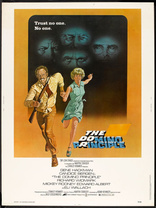
Price
Movie rating
5.7 | / 10 |
Blu-ray rating
| Users | 0.0 | |
| Reviewer | 2.0 | |
| Overall | 2.0 |
Overview
The Domino Principle (1977)
Tucker is serving a prison sentence for murder. A secret agency helps him to escape so that he can murder a person in a latin-American country. But Tucker only wants to escape, not to kill somebody.
Starring: Gene Hackman, Candice Bergen, Richard Widmark, Mickey Rooney, Edward AlbertDirector: Stanley Kramer
| Thriller | Uncertain |
| Drama | Uncertain |
Specifications
Video
Video codec: MPEG-4 AVC
Video resolution: 1080p
Aspect ratio: 1.78:1
Original aspect ratio: 1.85:1
Audio
English: DTS-HD Master Audio Mono
Subtitles
None
Discs
50GB Blu-ray Disc
Two-disc set (1 BD, 1 DVD)
Playback
Region A (locked)
Review
Rating summary
| Movie | 2.0 | |
| Video | 3.5 | |
| Audio | 3.5 | |
| Extras | 1.0 | |
| Overall | 2.0 |
The Domino Principle Blu-ray Movie Review
Reviewed by Jeffrey Kauffman March 4, 2014Note: This film is currently available only in this double feature: The Cassandra Crossing / The Domino Principle
.
The seventies are often perceived to be a decade of unbridled creativity in film, an era when a new generation of
filmmaker
eschewed the now largely dormant studio controlled system of production to craft more personal stories, often in rather
idiosyncratic ways. However, any objective parsing of the decade’s releases more than proves that old ways die hard,
and
behemoth retreads were still being foisted on the paying public with great regularity. Shout! Factory has been releasing
some interesting double features on Blu-ray over the past couple of years, with sometimes tangential connections
between the two films. Their latest offering, pairing 1976’s The Cassandra Crossing with 1977’s The Domino
Principle, is another kind of “strange bedfellows” duo, joined mostly due to their release year proximity as well as by
the perhaps unintended fact that each of them attempts to revisit genres that had already been mined more effectively
in
previous (better) films. The Cassandra Crossing is a big budget, “all star” disaster movie which came along at a
time when the disaster genre was already showing signs of precipitous decline. The Domino Principle is a
paranoid
political thriller that attempts to examine an all knowing, all seeing shadowy group of operatives that enlists unwilling
assassins, and so is a throwback to all sorts of films like The Manchurian Candidate, The Conversation and The Parallax View. Both of these films have
certain commendable aspects, though neither ever rises to any considerable level of greatness.
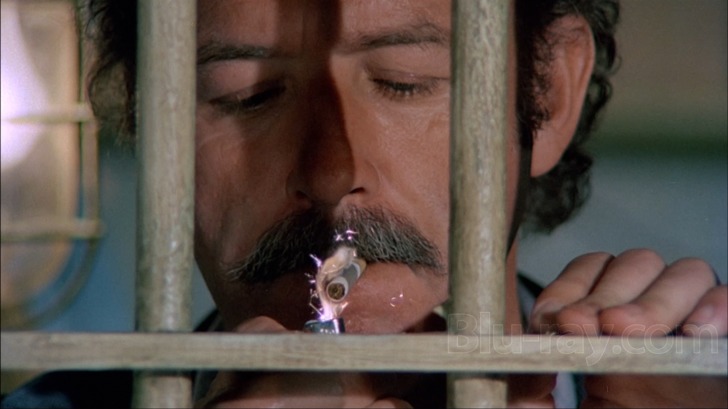
Stanley Kramer was an auteur known for his “message” films, and as either producer or director or indeed both, Kramer was responsible for some of the most iconic films of the 20th century, including High Noon, The Defiant Ones, On the Beach, Inherit the Wind, Judgment at Nuremberg and Guess Who’s Coming to Dinner?. (Kramer occasionally took time off from his “preaching” to make flat out entertainments like It's a Mad, Mad, Mad, Mad World.) Guess Who’s Coming to Dinner? was Kramer’s last all out success story, coming in 1967 just as a new wave of American filmmaker was beginning to take the torch of proselytizing, whether or not Kramer wanted to hand it over. Kramer’s penultimate film was The Domino Principle, and while it certainly has some fascinating elements, it ultimately collapses under the weight of its own improbabilities, seeming too heavy handed to ever really deliver much of a jolt.
The Domino Principle starts off with an almost comical montage that seems to have been lifted from some B-roll from A Clockwork Orange. As the word “assassination” cavorts across the screen (in several languages), we’re privy to a number of scenes of dead people while a portentous narrator informs us we’ve all been unwitting puppets of some unseen conspiratorial force for our entire lives. It’s actually a nice little hook to grab an audience, but it’s so over the top that the film has a hard time recovering once the actual narrative sets in.
That narrative has to do with a convict named Roy Tucker (Gene Hackman), who tools around the prison yard with his little buddy Spiventa (Mickey Rooney). Out of the blue a mysterious stranger named Tagge (Richard Widmark) shows up to inform Tucker that freedom is his if he merely agrees to work for Tagge’s organization for a relatively brief amount of time. Tucker is suspicious, but agrees, and he, along with Spiventa, escape their confinement. After a brief detour (which won’t be spoiled here), Tucker ends up in Costa Rica where he is able to reunite with his beautiful wife Ellie (Candice Bergen). After a halcyon few days, the organization gets Tucker and Ellie back to Los Angeles where their true colors are revealed: they want Tucker to perform an assassination, something that the now ex-con is unwilling to do.
That in turn sets up the bulk of the rest of the film, which plays out as an overly convoluted cat and mouse game between Tucker and various members of the organization. Ellie is taken hostage, which in turn leads Tucker into taking one of the organization’s members as a hostage himself. A supposed twist shows up late in the film (which probably everyone will see coming, considering the casting involved), and Kramer leaves a number of questions dangling at film’s end, ostensibly to up the paranoia quotient, but ultimately doing little more than creating confusion and frustration in the audience.
The Domino Principle is actually an okay thriller when you get right down to it, but it’s so obviously derivative of other films that it can never quite attain an identity of its own. You’ve seen a paranoiac Gene Hackman in the much better The Conversation, and most of the machinations in the plot of this film have similarly been utilized to better effect elsewhere.
The Domino Principle Blu-ray Movie, Video Quality 
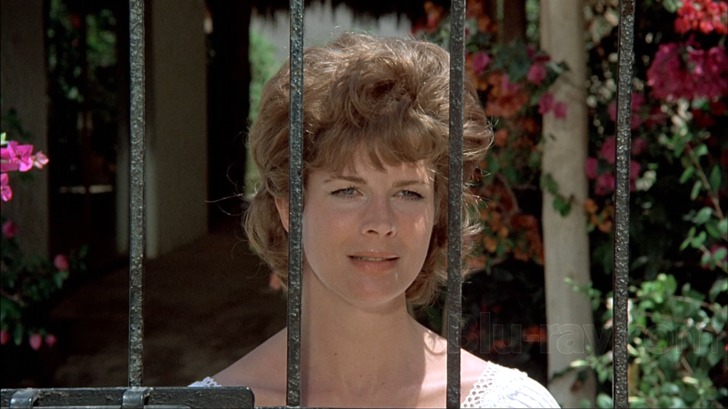
The Domino Principle is presented on Blu-ray courtesy of Timeless Media Group (an imprint of Shout! Factory) with an AVC encoded 1080p transfer in 1.78:1. While this release suffers from some of the same issues troubling its sibling The Cassandra Crossing, this is the better looking of the two transfers. Colors, while just a bit faded looking, are noticeably more vivid and robust, and fine detail is actually quite excellent in several close-ups. The biggest issue facing this transfer is recurrent density issues which create a kind of quasi-flicker. Unfortunately this tendency actually gets worse as the film goes along, making the last half or so somewhat problematic. This is not a deal killer, however, and anyone who is a fan of the film should be reasonably pleased with the look of this high definition presentation.
The Domino Principle Blu-ray Movie, Audio Quality 
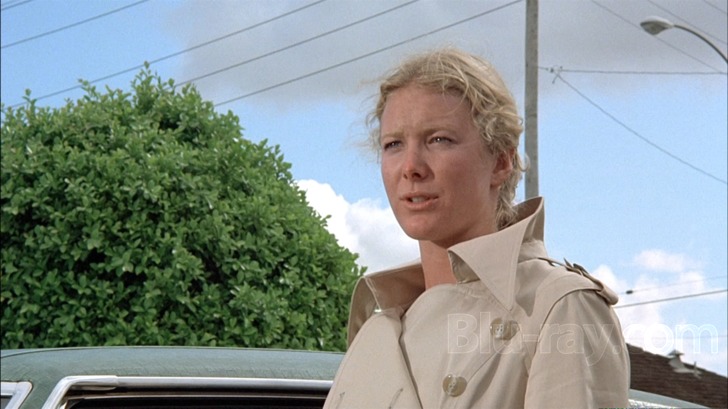
Likewise, The Domino Principle's lossless DTS-HD Master Audio Mono mix does not have the same distortion issues that hobbled The Cassandra Crossing. Billy Goldenberg's score sounds fine, as does the dialogue. The low end here is a bit on the anemic side, meaning some of the effects like a recurrent helicopter and gunfire aren't quite at the bombastic levels modern day audiophiles would prefer. Other than that anomaly, however, this track sports very good fidelity and reasonable dynamic range.
The Domino Principle Blu-ray Movie, Special Features and Extras 

- Trailer (1080p; 4:26)
- Behind the Scenes (1080p; 7:04)
The Domino Principle Blu-ray Movie, Overall Score and Recommendation 
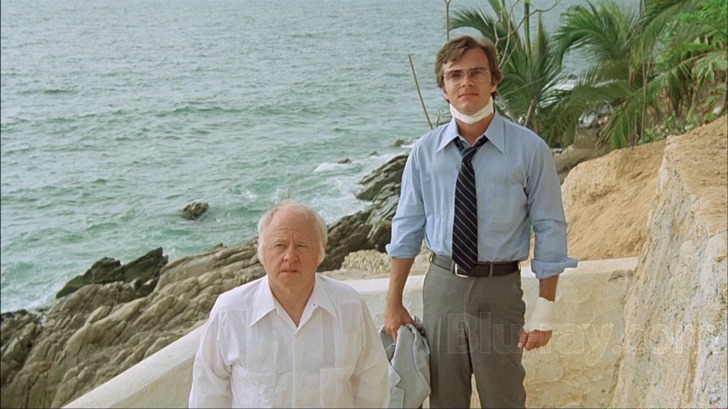
The Domino Principle has a few reasonably tense moments, but its hackneyed screenplay ultimately sinks this enterprise in a morass of silliness and faux hysteria. Kramer does what he can with the material, and the actors are all game, but this is one film most viewers will want to put out of its misery even if they're not being manipulated by some super-secret shadow organization.
Similar titles
Similar titles you might also like
(Still not reliable for this title)

Twilight's Last Gleaming
Nuclear Countdown
1977

The President's Analyst
Special Edition
1967

The Internecine Project
1974

Seven Days to Noon
1950

Seven Days in May
Warner Archive Collection
1964

Man Hunt
Limited Edition to 3000 - SOLD OUT
1941

The Parallax View
1974

The Ipcress File
1965

The Atomic City
1952

The Desperate Hours
1955

Undertow
2004

All My Sons
1948

Our Man in Havana
Limited Edition to 3000
1959

Hidden Agenda
1990

The Crossing Guard
1995

The Cassandra Crossing
1976

The Defiant Ones
1958

Advise & Consent
1962

The Mortal Storm
Warner Archive Collection
1940

3 Days of the Condor 4K
1975